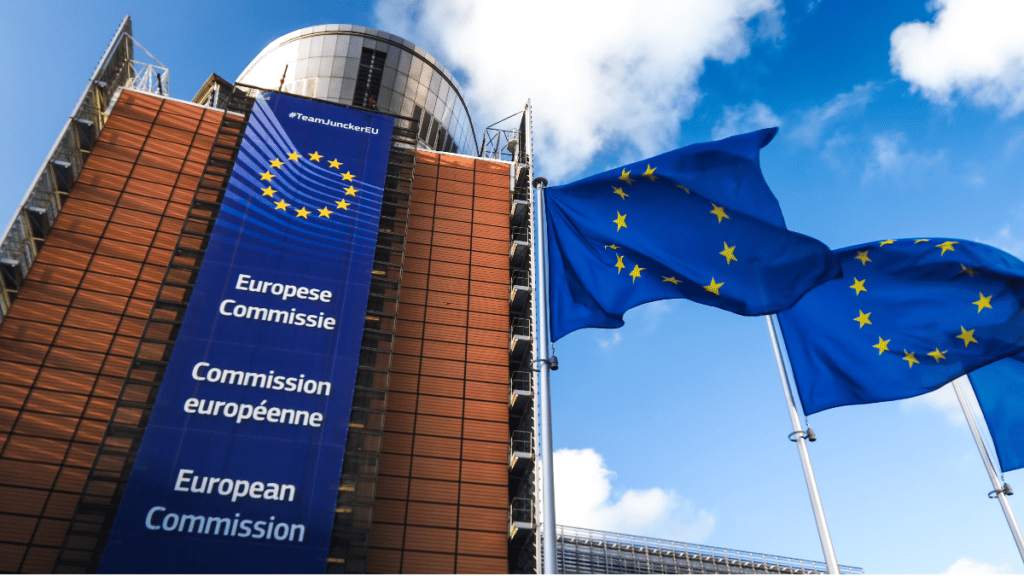Are Europe’s Values a Competitive Advantage or a Self-Imposed Limitation?
Andreas Schwab / Oct 16, 2025This piece is part of the "Ideas for Europe’s Future" series by Tech Policy Press. Read more about the series here.

Flags of the European Union aside a European Commission building.
When a global tech giant like Apple publicly calls on the European Union to repeal a democratically adopted law such as the Digital Markets Act (DMA), and Google backs a study accusing that law of opacity and over-complexity, the issue at stake is not merely about regulation. It goes to the heart of Europe’s identity in the digital age: Are European values—fairness, openness, democracy, and the rule of law—a burden that slows Europe down, or are they the bloc’s most powerful competitive asset?
Rules as a source of strength
The DMA, together with its sister regulation, the Digital Services Act (DSA), is the outcome of years of debate, compromise, and democratic decision-making. Together they form the backbone of Europe’s new digital rulebook—one that protects consumers, ensures fair competition, and upholds our fundamental freedoms online. The DMA prevents gatekeepers from using their dominance to lock in users, shut out competitors, or dictate the conditions of digital life for millions of citizens. The DSA complements this by protecting users’ rights in the digital sphere: it obliges platforms to remove illegal goods or content swiftly while preserving the freedom of speech that defines open societies.
These laws are not bureaucratic burdens. They are deliberate choices that ensure innovation serves people—not the other way around. Europe’s approach to digital governance is founded on the conviction that markets and societies function best when power is balanced, rights are respected, and accountability is clear.
Apple and Google warn that the DMA undermines security, safety, or discourages investment in innovation. Yet their resistance is revealing. The DMA strikes at the heart of their business models—closed ecosystems that control access, distribution, and data. Opening those systems to competition does not stifle innovation; it multiplies it by strengthening app developers’ rights and ability to innovate.
Digital sovereignty, not isolation
Europe’s insistence on setting its own digital rules is sometimes caricatured as protectionism and as its sole way of surviving. There is a saying about digitalization: the US is the place where the technology is born, China is the place where it can be better developed and the EU is the place where it will be regulated. However, Europeans are only applying their values to the digital sphere and are protecting their sovereignty. Europe does not allow others to decide which markets may open, which data may circulate, or which speech may remain online. Under the DSA, illegal products or hate speech can be removed swiftly, yet lawful expression remains protected. Under the DMA, developers can innovate freely without fear of being excluded by dominant gatekeepers.
Already, other jurisdictions are following the European lead. Japan and the United Kingdom have drafted legislation inspired by the DMA. The world is watching as Europe proves that democracies can set clear digital rules without crushing innovation. That is leadership—not limitation.
Values that drive innovation
Regulation and innovation are not opposites. The DMA and DSA demonstrate together that clear rules can create space for new ideas by ensuring fairness, safety and predictability. When developers gain equal opportunity to reach users, and when consumers can rely on safe online marketplaces, everyone benefits: more choice, more creativity, better prices, and greater trust.
Recent developments show this in practice. Under the DMA, iPhone users will be able to pair devices from different manufacturers more easily, receive notifications from non-Apple smartwatches, and choose between alternative services for sharing files or payments. Those are tangible improvements—made possible by a regulatory dialogue under the DMA between the European Commission and Apple. The DMA does not compromise on Europe’s high standards of privacy and security. That balance is precisely what distinguishes the European model from both laissez-faire deregulation and state-controlled digital economies.
At the same time, the DSA ensures that when consumers buy products online, they are protected from counterfeit goods and fraudulent sellers: the ongoing European Commission’s investigation on Temu due to potential breach of its obligations under the DSA with regard to the sale of illegal products in the categories of baby toys and small electronic devices.
The transatlantic perspective
Even in the United States, the narrative is shifting. Earlier this year, a coalition of American start-ups and investors urged the White House to see the DMA as an opportunity rather than a threat—a model that could enhance innovation and consumer trust. And US courts have begun to limit the absolute control of dominant platforms. In the “Epic Games v. Google” case, judges ruled that developers cannot be indefinitely banned from offering alternative payment systems.
Across the Atlantic, the same lesson is emerging: competition and innovation thrive when power is constrained and rules are clear.
Turning values into strategic advantage
Europe’s digital policy is often portrayed as defensive—reacting to the US or Chinese technological power. In reality, it is strategically offensive: it defines the terms of fair digital trade for a global market hungry for trust and accountability.
Europe’s commitment to privacy, fairness, and transparency is not a cost to be endured; it is a brand of reliability. European consumers and businesses know that technology operating under European law must respect their rights. That trust is an economic asset no algorithm can replicate.
The choice before Europeans, then, is not between values and competitiveness. It is whether they dare to recognize that European values are themselves a form of competitiveness—one built on legitimacy, stability, and social cohesion. Short-term advantage may come from ignoring rules; long-term success comes from building systems people can believe in.
Confidence in Europe’s path
Europe’s way is not the fastest or the flashiest. It relies on debate, consultation, and compromise—processes that take time but ensure durability. Europe will continue to refine the DMA and DSA and adapt them where necessary, but the solution cannot be to abolish them. Europe does not need unregulated markets that leave citizens powerless, nor over-regulation that smothers creativity. Europe’s goal is clear: a digital economy that is open, competitive, and fair—to the benefit of everyone in Europe.
European values—democracy, fairness, transparency, and respect for privacy—are not constraints. They are Europe’s engine of legitimacy, currency of trust, and ultimately the EU’s most enduring competitive advantage in a digital world that increasingly needs exactly what Europe offers: rules that protect, markets that open, and innovation that serves people.
Authors
